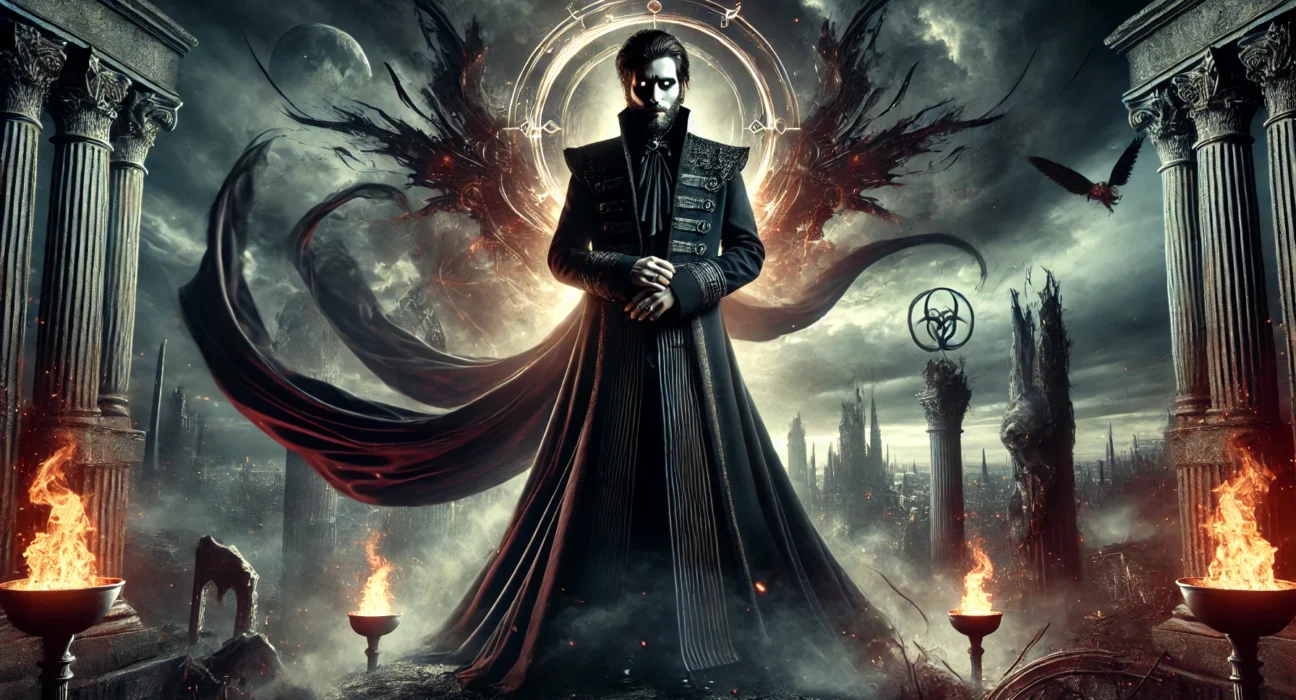The Antichrist by Friedrich Nietzsche, written in 1888 and first published in 1895, stands as one of Nietzsche’s most incendiary works, providing a fierce critique of Christianity and its ethical system. Nietzsche, a philosopher known for his radical ideas, uses this text to attack what he views as the decadence and weakness that Christianity fosters in human culture. Written during a period of intense creative output near the end of his intellectual career, The Antichrist was initially intended as part of his larger work, The Will to Power. Nietzsche’s exploration of power, morality, and human evolution is at the core of this work, cementing his reputation as a provocateur who questioned the fundamental tenets of Western philosophy and religion.
Plot Summary
In a world that glorifies weakness, where pity and submission are the highest virtues, a voice rises in fierce opposition. This voice belongs to a man who sees the essence of life not in surrender but in power, not in meekness but in strength. Nietzsche steps forward, his gaze fixed on the degradation he perceives in humanity. He speaks with the intensity of a prophet, scorning the moral framework that has shackled the human spirit for millennia. He turns his wrath upon the very foundations of the moral world—Christianity—and, in doing so, seeks to liberate humanity from what he calls its sickness.
At the heart of his critique lies the figure of Jesus, but not the Jesus of churches and cathedrals, not the Jesus portrayed as the soft-hearted savior. Nietzsche’s Jesus is something else—a noble figure, tragically misunderstood. This Jesus is free from the poison of resentment and vengeance, qualities that, in Nietzsche’s view, came to dominate the religion built in his name. To Nietzsche, Jesus was a man whose actions embodied a radical indifference to worldly power, someone who transcended human pettiness. His death was not the result of martyrdom but the natural end of one who lived too freely in a world bound by rules. Yet it was not Jesus who Nietzsche blames for the disease of Christianity. No, the true villain in this tale is Paul.
Paul, the apostle, stands accused of betraying everything Jesus represented. It is Paul who took the message of life and transformed it into a religion of death. Under Paul’s hand, Christianity became not a celebration of life but a condemnation of the strong. Paul, in Nietzsche’s view, turned the teachings of Jesus into a doctrine of resentment—aimed not at uplifting humanity but at bringing the strong down to the level of the weak. With Paul came the institution of guilt, sin, and redemption, concepts Nietzsche saw as chains that bind humanity to its lowest instincts.
As Christianity spread, it carried with it this ethic of weakness. It infiltrated not just the hearts of the poor and downtrodden, but even the souls of those who had once been powerful. The Romans, who once ruled through might and virtue, succumbed to this new creed of pity. Over time, the noble spirit of ancient civilizations was eroded. The strong were no longer celebrated for their strength. Instead, they were taught to bow, to humble themselves before a God who prized suffering and self-denial.
But Nietzsche refuses to bow. He speaks for those who, like himself, refuse the yoke of Christian morality. He calls them the Hyperboreans, those who live beyond the reach of this decaying world. They are the rare ones, the strong ones, who still understand the true nature of life. For Nietzsche, life is not about sacrifice or submission. Life is a struggle, a contest of wills, and only those who embrace this struggle are worthy of it.
The will to power is at the core of Nietzsche’s vision. Power, for him, is not merely the ability to dominate others, but the creative force that drives all of existence. It is the capacity to impose one’s vision on the world, to shape reality according to one’s desires. Those who possess the will to power are the ones who can rise above the herd, the masses who cling to their pitiful ideals of equality and charity. Christianity, in Nietzsche’s eyes, is the great enemy of this will to power. It teaches people to suppress their instincts, to deny their desires, to live in fear of judgment and punishment.
And so, Nietzsche sees Christianity not only as an error but as an active force of destruction. It undermines the very foundations of human greatness, elevating the weak and the sickly to positions of moral superiority. It teaches that suffering is noble, that the meek shall inherit the earth. To Nietzsche, this is the ultimate lie. There is nothing noble in weakness, nothing virtuous in submission. The weak should perish, he says, and the strong should rule. Only through the cultivation of strength, through the ruthless pursuit of power, can humanity hope to achieve its highest potential.
Yet, Christianity is not the only target of Nietzsche’s attack. He turns his gaze toward modernity as well, criticizing the complacency of his contemporaries. The modern world, with its ideals of tolerance and democracy, is, for Nietzsche, a manifestation of the same sickness. It is a world that celebrates mediocrity, that forgives everything in the name of understanding. The modern man, lost in his endless pursuit of comfort and peace, has forgotten the true meaning of life.
For Nietzsche, there is no redemption in pity, no salvation in forgiveness. He rejects the idea of a life lived in preparation for another, higher existence. Heaven, hell, salvation—these are nothing but illusions, traps set by those who would keep humanity weak and docile. Instead, Nietzsche calls for a return to the earth, a return to the body, and a return to the instincts. He calls for a revaluation of all values, where strength, power, and vitality are celebrated, and weakness is despised.
In the end, Nietzsche offers no consolation, no easy answers. He does not promise a utopia or a paradise. He simply challenges humanity to be better, to be stronger, to rise above the shackles of its own making. His vision is harsh, even brutal, but it is also filled with the energy of life. Nietzsche’s challenge is for humanity to overcome itself, to become more than what it is. It is a call to greatness, a call to power.
The world Nietzsche envisions is one of struggle and conflict, but also one of immense possibility. It is a world where those who are strong enough to seize their destiny can create something new, something great. But to reach that world, humanity must first cast off the chains of Christianity, with all its false promises and empty virtues. Only then can it truly begin to live.
Main Characters
- Friedrich Nietzsche (Narrative Voice): The central voice throughout The Antichrist, Nietzsche positions himself as an adversary to Christian morality. His persona is of a philosopher beyond humanity’s conventions, speaking with disdain for the “weak” values of modern civilization. He is passionately committed to the will to power, which he views as the force for human progress.
- Jesus Christ: Though not a character per se, Nietzsche discusses Jesus as a figure corrupted by the institution of Christianity. Nietzsche differentiates between Jesus, who he saw as a noble, misunderstood figure, and St. Paul, whom he accuses of distorting Jesus’s teachings.
- St. Paul: Nietzsche presents Paul as the chief villain who transformed Jesus’s message into a doctrine of ressentiment, leading to the religion’s focus on guilt and submission.
- The Hyperboreans: A symbolic group Nietzsche mentions in the preface, representing those superior individuals who, like himself, reject common morality and seek to transcend conventional human limitations.
Theme
- Critique of Christianity: Nietzsche’s primary target is Christianity’s moral system, which he sees as glorifying weakness, pity, and submissiveness. He argues that it promotes mediocrity and represses humanity’s natural instincts for power, vitality, and greatness.
- Will to Power: Nietzsche advocates for the will to power as the driving force behind human achievement and excellence. He opposes any system, especially Christianity, that suppresses this natural striving in favor of humility or self-denial.
- Decadence and Ressentiment: Nietzsche links Christianity to decadence, arguing that it represents the degeneration of the human species. Ressentiment is a core concept in the book, describing how Christianity emerges from the resentment of the weak against the strong.
- Overcoming Humanity: Nietzsche introduces the concept of the Übermensch, or “overman,” which is developed in other works like Thus Spoke Zarathustra. In The Antichrist, he emphasizes that humanity must transcend the limitations imposed by Christian values to evolve into a higher form of life.
Writing Style and Tone
Nietzsche’s style in The Antichrist is direct, polemical, and often provocative. His writing is characterized by aphorisms—short, pointed statements that are designed to shock the reader out of complacency. He uses strong, vivid language to depict Christianity as a religion of decay, contrasting it with his vision of human greatness. His style is often fragmented, with ideas expressed in bursts rather than continuous arguments, reflecting his desire to break free from traditional philosophical discourse.
The tone of The Antichrist is fiercely combative and unapologetically elitist. Nietzsche sees himself as part of a select few (the “Hyperboreans”) capable of rising above the mediocrity he associates with modern morality. The work exudes disdain for pity, equality, and humility, with Nietzsche positioning himself as an adversary to both Christian values and the democratic ideals of his time. His tone combines philosophical rigor with an almost prophetic zeal, aiming to dismantle what he sees as centuries of moral corruption.
We hope this summary has sparked your interest and would appreciate you following Celsius 233 on social media:
There’s a treasure trove of other fascinating book summaries waiting for you. Check out our collection of stories that inspire, thrill, and provoke thought, just like this one by checking out the Book Shelf or the Library
Remember, while our summaries capture the essence, they can never replace the full experience of reading the book. If this summary intrigued you, consider diving into the complete story – buy the book and immerse yourself in the author’s original work.
If you want to request a book summary, click here.
When Saurabh is not working/watching football/reading books/traveling, you can reach him via Twitter/X, LinkedIn, or Threads
Restart reading!








